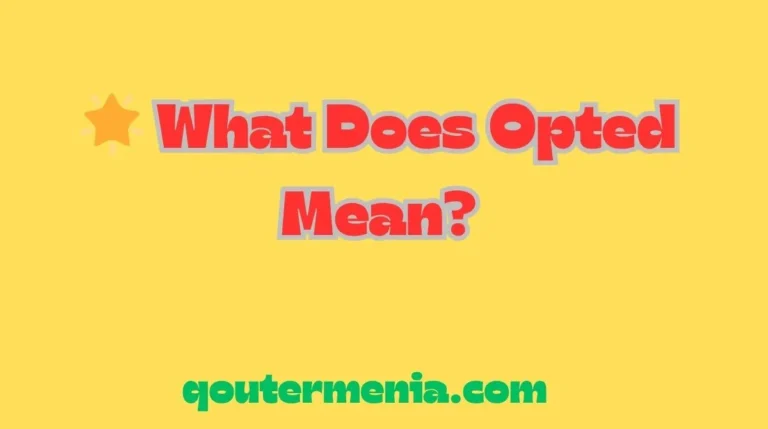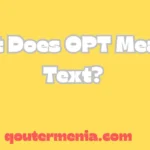Have you ever come across the word “opted” in a message, email, or online form and wondered what it really means?
🤔 You’re not alone! Millions of people search for what does opted mean every month, especially because it pops up in so many different contexts — from social media and school to online privacy settings and workplace emails.
In simple terms, “opted” comes from the verb opt, which means to choose or to make a decision among alternatives.
However, the way it’s used today can vary depending on where you see it — someone might say they “opted out” of a group chat, while another says they “opted for” remote work.
In this guide, we’ll explore the meaning, usage, origins, variations, and real-world examples of “opted” in different situations — helping you understand it clearly and use it confidently in conversations or writing.
1. Meaning & Definition of “Opted”
The word “opted” is the past tense and past participle of the verb “opt.”
Primary Meaning
- To choose or make a decision between two or more options.
Example: She opted to stay home instead of going to the party.
Secondary Meanings
- To express preference: He opted for vegetarian food.
- To make a deliberate choice or exclusion: They opted out of the company’s mailing list.
| Phrase | Meaning | Example |
|---|---|---|
| Opted for | Chose something | I opted for a cheaper plan. |
| Opted out | Declined participation | He opted out of the survey. |
| Opted in | Chose to join or agree | Users opted in to receive updates. |
In essence, “opted” means you made a conscious choice — not by accident or force, but by preference.
2. Background & Origin
The word “opt” traces its roots to the Latin term “optare,” which means to choose, wish, or desire.
It entered the English language around the late 19th century, first used in formal or political contexts. Over time, it became popular in everyday English — especially in business and communication.
Timeline Snapshot
| Century | Language Stage | Meaning/Usage |
|---|---|---|
| 1600s | Latin “optare” | wish, desire |
| 1800s | French “opter” | to choose |
| 1870s | English “opt” appears | to make a choice |
| 1900s onward | Modern English | used in everyday life and technology |
Interestingly, the rise of digital privacy laws and online subscriptions made the word “opt” (especially “opt-in” and “opt-out”) a key part of internet vocabulary.
3. Usage in Different Contexts
The beauty of the word “opted” is its versatility. It’s used in personal, professional, and digital spaces.
In Conversations
- I opted for coffee instead of tea.
- She opted not to attend the event.
In Education
- He opted for Physics as his elective subject.
- Students opted out of the field trip.
In Business
- Customers opted into the loyalty program.
- Employees opted for flexible schedules.
In Technology & Online Settings
- Users opted in to receive push notifications.
- They opted out of data tracking for privacy.
So, whether you’re choosing a plan, signing up for a newsletter, or making a decision at work, “opted” shows a clear, voluntary choice.
4. Meanings Across Platforms (WhatsApp, Instagram, TikTok, Snapchat)
Each social platform uses “opted” in slightly different ways — often connected to privacy, notifications, or participation.
| Platform | Meaning of “Opted” | Common Usage |
|---|---|---|
| Joining or leaving groups or features | You’ve opted out of read receipts. | |
| Consent for updates or ad preferences | You opted into creator monetization. | |
| TikTok | Participation in trends or data-sharing | Users opted out of personalized ads. |
| Snapchat | Control over visibility or features | He opted out of location sharing. |
Example in chat style:
Alex: Did you see the group update?
Lena: Nope 😅 I opted out of that group last week.
Here, “opted out” means Lena chose to leave — not by removal but by decision.
5. Other Fields & Technical Meanings
Beyond everyday use, “opted” appears in specialized areas too:
| Field | Meaning | Example |
|---|---|---|
| Medical | Decision for or against a treatment | The patient opted for surgery. |
| Physics/Engineering | Selecting a method or system | The team opted for a laser-based measurement. |
| Aviation | Choosing between aircraft options | The airline opted for Airbus over Boeing. |
| IT & Cybersecurity | Data permission settings | Users opted out of data tracking. |
| Government/Policy | Refusal or acceptance of regulations | Some states opted out of the agreement. |
In all fields, “opted” maintains the core meaning of choice — an intentional decision between alternatives.
6. Common Misconceptions & Mistakes
Many people misuse “opted” or confuse it with other verbs. Let’s clear that up.
❌ Common Mistakes
- Saying “He opted the plan” ❌
✅ Correct: He opted for the plan. - Saying “I opt out the group” ❌
✅ Correct: I opted out of the group.
💡 Tip:
The correct prepositions matter:
- Opted for → choosing something
- Opted out of → rejecting something
- Opted in to → joining or agreeing
Common Confusion:
Some people think “opted” always means “left” or “refused,” but that’s only true for opted out. The meaning depends on what follows — “for,” “in,” or “out.”
7. Similar Terms & Alternatives
| Word | Meaning | When to Use |
|---|---|---|
| Chose | Made a decision | General use: She chose red over blue. |
| Selected | Picked from a group | Formal use: He selected the best candidate. |
| Decided | Made up one’s mind | Broader: They decided to travel. |
| Preferred | Favored one thing | Emotional choice: She preferred quiet over noise. |
| Elected | Chose formally or officially | Political/professional: They elected a leader. |
👉 “Opted” feels slightly more formal than “chose” but less formal than “selected.” It’s often used when there’s a deliberate decision or consent involved.
8. How to Respond to “Opted” — Practical Chat Examples
Sometimes you’ll see “opted” in messages, like:
“You have opted out of receiving emails.”
“She opted for online learning this semester.”
Here’s how you can reply naturally:
Chat Examples
Example 1
Friend: I opted for pizza instead of sushi. 🍕
You: Great choice! Pizza always wins 😋
Example 2
Message: You’ve opted out of notifications.
You: Oh, can I opt back in? I didn’t mean to turn them off!
Example 3
Coworker: I opted to work from home today.
You: Smart move — the weather’s terrible anyway! ☔
Example 4
Newsletter: You opted in to receive weekly updates.
You: Perfect — looking forward to them! 👍
9. Differences from Similar Words
| Term | Subtle Difference | Example |
|---|---|---|
| Opted | Conscious decision or preference | She opted for digital marketing. |
| Chose | General act of selecting | She chose a new book. |
| Decided | Concluded after thinking | He decided to move abroad. |
| Selected | Picked from a specific list | The manager selected the best resume. |
🧠 Quick Tip:
“Opted” emphasizes freedom and consent.
“Selected” emphasizes accuracy.
“Decided” emphasizes finality.
10. Relevance in Online Conversations & Dating Apps
In modern communication — especially social media and dating platforms — “opted” often carries a sense of choice, boundaries, or privacy.
Examples
- I opted out of Tinder for a while. → taking a break or deleting the app
- He opted for Bumble instead. → switching platforms
- They opted in to share their profile publicly. → giving consent
It’s also used humorously:
Opted for pizza and Netflix instead of a date tonight. Priorities 😎
So yes, even in dating culture, “opted” has become a modern symbol of personal choice and self-control.
11. Popularity & Trends Over Time
The term “opted” gained notable traction with the rise of email marketing and digital consent forms in the 2000s.
Trends Overview (Based on Google Search Data)
- 📈 1990s: Minimal use, limited to politics or academic writing.
- 📈 2000–2010: Increased use with the internet boom — especially “opted in/out.”
- 📈 2015–2025: Strong usage in data privacy, online communication, and social media language.
Fun Fact:
The phrases “opted out of cookies” and “opted for online work” spiked during and after the COVID-19 pandemic as people adjusted to digital life.
12. FAQs & Related Queries
1. What does “opted” mean in simple words?
It means “chose” or “decided.” Example: She opted to stay home.
2. What’s the difference between “opted for” and “opted out”?
- Opted for → chose something.
- Opted out → chose not to participate.
3. What does “opted in” mean on websites or apps?
It means you agree to receive messages, updates, or share data voluntarily.
4. Is “opted” formal or informal?
It’s semi-formal — suitable for both conversations and professional writing.
5. What is an example of “opted” in a sentence?
I opted for the morning flight instead of the evening one.
Conclusion
The word “opted” might seem simple, but it carries a powerful message — the freedom to choose. Whether it’s opting for a lifestyle, opting out of notifications, or opting into a trend, it reflects conscious, intentional decisions that shape our daily lives.
From its Latin roots to its modern digital meanings, “opted” has evolved beautifully with human expression — reminding us that every choice, no matter how small, defines who we are. 🌱
So next time someone says they “opted for something,” you’ll know exactly what they mean — and how to respond naturally, confidently, and maybe even with a smile. 😊

Emily Martin is the creative author at Qouter Menia, crafting heartfelt quotes and captions that beautifully express emotions.







